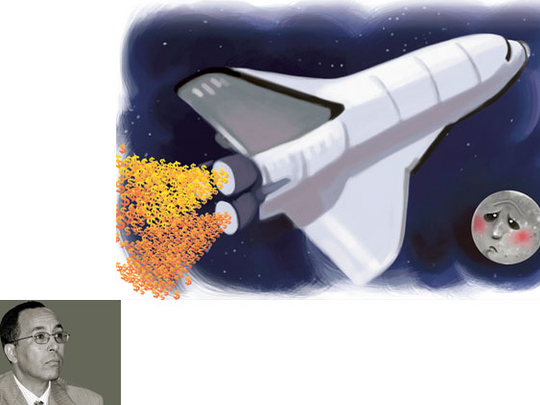
The launch of a new space mission, and even more so the failure of a spacecraft (as we witnessed recently), invariably leads me to face the following question from students and acquaintances: why do we waste that kind of money in space pursuits when we have so much poverty and suffering that we should be trying to alleviate here on earth?
That's a good, well-meaning question, and it deserves a good answer. There are several arguments that one can bring up in addressing this concern.
First, one must examine more closely just how much money is being "wasted" in space projects and compare that with other human expenditures.
The total space budget of all nations on Earth is less than $40 billion (Dh147 billion). Nasa's budget for 2012 is $19.5 billion (that is 0.5 per cent of the entire US budget); ESA's (the European Space Agency's) budget was $5.65 billion in 2011; the Russian space budget amounted to about $2.5 billion; China's is $2 billion; India's is $1.6 billion; plus small amounts for smaller countries.
The whole human expenditure on space projects, including all satellites, rockets, spacecrafts and the hundreds of thousands of people who work on that, increases by less than 1 per cent each year!
Contrast this with the world's spending in the military sector (armament and personnel): a whopping $1.6 trillion in 2010, the US part representing 42 per cent of that! That's 40 times more than the worldwide space budget, and that amount increases by about 5 per cent each year.
Destructive expenditure
Now, lest anyone think that they are not responsible for any of this (neither the space money ‘waste' nor the scary military budget), I would like to mention a few other kinds of expenses, these being more at the personal level. Each year in Europe (for which we have statistics), people spend about $50 billion a year on cigarettes; Europeans, who constitute only 10 per cent of humans, spend $150 billion a year on alcoholic drinks, $24 billion on pet food, $200 billion on cosmetics, and $1.4 trillion on entertainment and media (music, cinema, TV shows, electronics, newspapers and magazines)!
At this point of the discussion, my interlocutors usually respond with: yes, we humans are clearly wasting large sums of money on destructive items (weapons, cigarettes, alcohol), but does that mean that we should throw away more money in space? There are two ways to counter this argument. One line is to list the numerous and diverse spin-offs that have resulted from space research. Indeed, because space places different sets of constraints on any project, be it a new satellite or a trip to Mars, new tools often need to be developed, and these almost always find applications in our lives here on Earth.
There are, without exaggeration, hundreds of spin-offs, ranging from bio-medical techniques to digital systems, from imaging technology to robotics, where important uses have been found in medicine, meteorology, environmental monitoring (of potential or unfolding disasters), information and communication technology, remote sensing, surveillance, and many other fields.
What must be stressed is that such applications do indeed lead to helping address and alleviate the poverty and human suffering, which the sceptics of space projects insist that we focus on.
Another line of argumentation against the idea that "space projects are a luxurious waste and should at most be left to very rich countries" is more cultural and educational. Indeed, the pursuit of such ‘lofty' projects strongly reflects the intellectual attitude of a given nation: the more we look upward the more future-minded and less materialistic we prove to be. And the more governments push their people to seek discoveries of all kinds (space-bound or earth-focused), the more people will tend to pursue scientific and cultural careers and lift the whole society up in various ways. In many parts of the world, including in this region, students are fleeing the scientific disciplines, seeing them as difficult and not financially rewarding — compared to administrative and business careers. We must do everything to encourage our children and students to invest themselves in those fields, for they are not only fascinating but extremely important. Let us not forget the strategic importance of space, where powers engage in espionage and ‘monitoring'.
Encouragement for students to take on this field and its applications must come in the form of strategic projects, where governments and companies invest for the future. Salaries and rewards must be substantial. But most importantly, society in general, and the vital education and media sectors in particular, must project a bright image of those fields and of the people who pursue them.
It is a shame that hardly anyone can name an Arab or Muslim astronaut (yes, a few have gone up to space), but many can name entire sports teams or movie casts. We need to change this, for our future and our children's.
Nidhal Guessoum heads the Physics Department at the American University of Sharjah.











